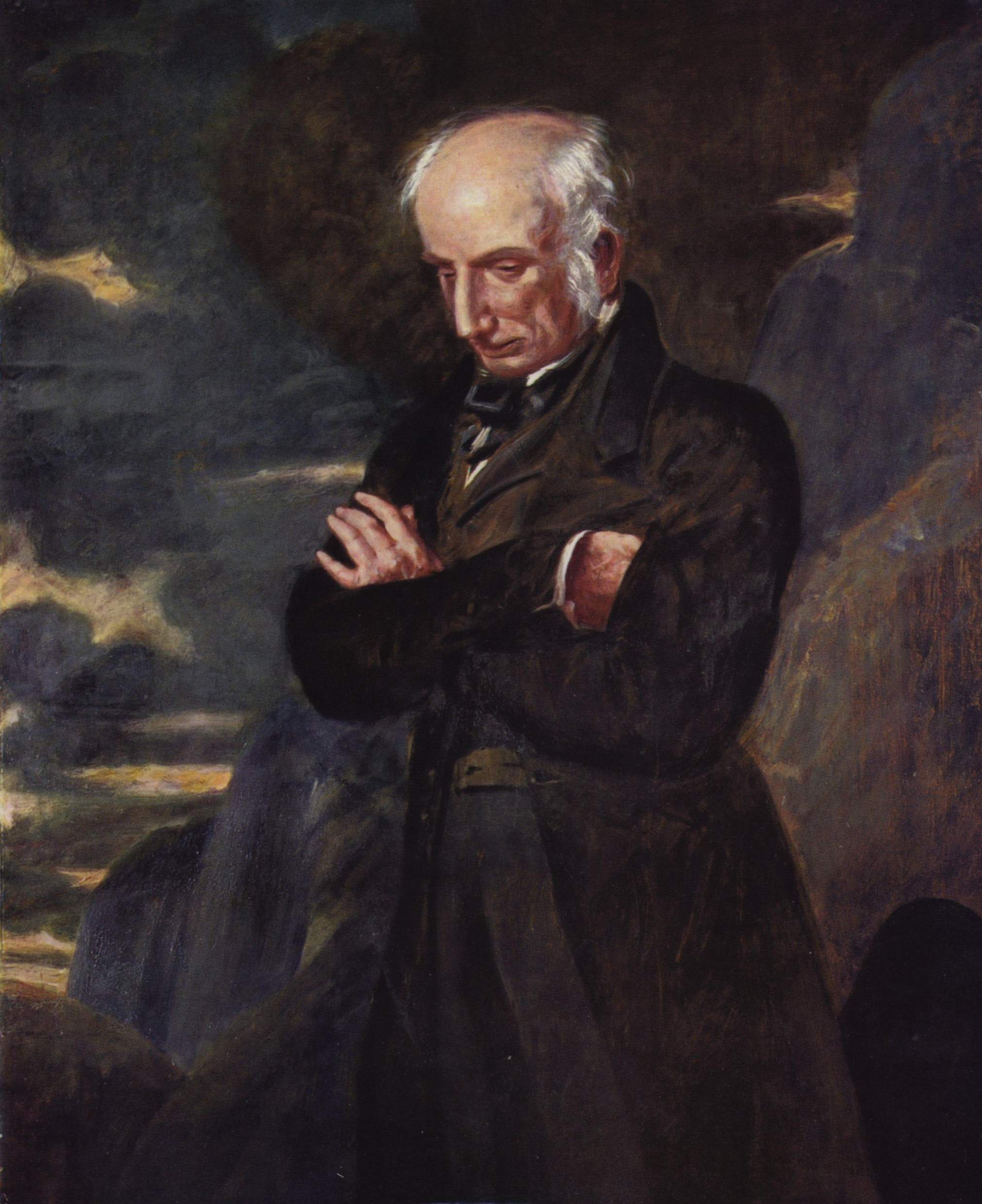“Los placeres recién descubiertos son dulces. Cuando mienten sobre nuestros pies.”
Fuente: To the Same Flower, capítulo 1 (1803).
William Wordsworth fue uno de los más importantes poetas románticos ingleses. Con Samuel Taylor Coleridge, contribuyó a la evolución de la época romántica en la literatura inglesa con su publicación conjunta de Baladas líricas en 1798. Esta obra influyó de modo determinante en el paisaje literario del siglo XIX. Fue el poeta laureado de Inglaterra desde 1843 hasta su muerte en 1850.
El carácter fuertemente innovador de su poesía, ambientada en el sugerente paisaje del Lake District , en el norte de Cumberland, radica en la elección de los protagonistas, personajes de humilde extracción, del tema, que es la vida cotidiana, y del lenguaje, sencillo e inmediato.
Wordsworth, Coleridge y Southey fueron conocidos como lakistas, por inspirarse en el mismo paisaje de los lagos.
Wikipedia

“Los placeres recién descubiertos son dulces. Cuando mienten sobre nuestros pies.”
Fuente: To the Same Flower, capítulo 1 (1803).
“Dulces dias infantiles, que eran siempre. Veinte días son ahora.”
Como una mariposa (I've Watched You Now a Full Half-Hour), sección. 2 (1801).
Fuente: http://www.gutenberg.org/browse/authors/w#a2879
“El arte es expresión de los sentimientos y emociones del artista.”
A Narrow Girdle of Rough Stones and Crags, l. 37 (1803).
Fuente: http://rpo.library.utoronto.ca/redirect/fromlink.cfm?new=poet/363.html
“In years that bring the philosophic mind.”
Intimations of Immortality Stanza 10.
Bartlett's Familiar Quotations, 10th ed. (1919)
“The harvest of a quiet eye,
That broods and sleeps on his own heart.”
Stanza 13.
A Poet's Epitaph (1799)
“Stern Winter loves a dirge-like sound.”
On the Power of Sound, xii.
Bartlett's Familiar Quotations, 10th ed. (1919)
Stanza 7.
Resolution and Independence (1807)
Composed upon Westminster Bridge, Sept. 3, 1802, l. 1 (1802).
Fuente: Character of the Happy Warrior http://www.bartleby.com/145/ww302.html (1806), Line 48.
Fuente: Character of the Happy Warrior http://www.bartleby.com/145/ww302.html (1806), Line 23.
To the Same Flower (the Daisy), st. 1 (1805).
“And he is oft the wisest man
Who is not wise at all.”
The Oak and the Broom.
Bartlett's Familiar Quotations, 10th ed. (1919)
“As if the man had fixed his face,
In many a solitary place,
Against the wind and open sky!”
Part I, stanza 16.
Peter Bell (1798)
“The sweetest thing that ever grew
Beside a human door!”
Lucy Gray, or Solitude, st. 2 (1799).
Lyrical Ballads (1798–1800)
“Pleasures newly found are sweet
When they lie about our feet.”
To the Same Flower (the Small Celandine), st. 1 (1803).
Three Years She Grew in Sun and Shower, st. 1 (1799).
Lyrical Ballads (1798–1800)
“Drink, pretty creature, drink!”
The Pet Lamb. A Pastoral, st. 1 (1800).
Lyrical Ballads (1798–1800)
“Brothers all
In honour, as in one community,
Scholars and gentlemen.”
Bk. IX, l. 227.
The Prelude (1799-1805)
“He murmurs near the running brooks
A music sweeter than their own.”
Stanza 10.
A Poet's Epitaph (1799)
Written in London, September 1802, l. 9 (1802).
“Controls them and subdues, transmutes, bereaves
Of their bad influence, and their good receives.”
Fuente: Character of the Happy Warrior http://www.bartleby.com/145/ww302.html (1806), Line 17.
To the Daisy.
Bartlett's Familiar Quotations, 10th ed. (1919)
The Trosachs.
Bartlett's Familiar Quotations, 10th ed. (1919)
The River Duddon, sonnet 34 - Afterthought, l. 13 (1820)
My Heart Leaps Up When I Behold, (1802); the last three lines of this form the introductory lines of the long Ode: Intimations of Immortality from Recollections of Early Childhood begun the next day.
“Blessings be with them, and eternal praise,
Who gave us nobler loves, and nobler cares!”
The Poets, who on earth have made us heirs
Of truth and pure delight by heavenly lays.
Personal Talk, Stanza 4
Bartlett's Familiar Quotations, 10th ed. (1919)
Stanza 3
Lyrical Ballads (1798–1800), Lines written a few miles above Tintern Abbey (1798)
Stanza 3
Lyrical Ballads (1798–1800), Lines written a few miles above Tintern Abbey (1798)
Stanza 2
Lyrical Ballads (1798–1800), Lines written a few miles above Tintern Abbey (1798)
Lines (1795)